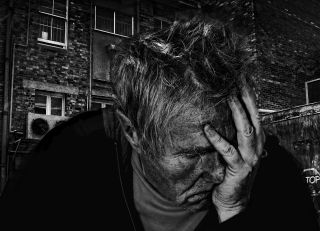Locus of Control
Crisis as Danger and Opportunity
In the crucible of crisis, we forge the strength to rise above.
Posted November 9, 2023 Reviewed by Gary Drevitch
Key points
- Both individual and mass crises can lead to positive change.
- We can choose to grow from our experiences, even the most painful ones.
- Communities devastated by disasters often come together in new ways to help each other rebuild.

In Chinese, the character for the concept of "crisis" is a combination of "danger" and "opportunity."
危机
This symbol graphically connects danger to our physical or psychological safety and the opportunity to choose how we will respond. A crisis requires some response.
People are experiencing monumental crises around the world these days. Earthquakes and tsunamis, hurricanes and homelessness, famines and genocides, overdoses and suicides, terrorism and mass shootings, wars, plagues, and rampant social unrest and violence.
At this moment, we are all either directly experiencing or witnessing from afar the devastating conflict in Israel. Such events represent danger and opportunity on the grandest scale.
Beyond the danger of the events themselves, we understand the long-term damage these traumatic experiences can inflict on fragile human bodies and souls. Though there is significant variation in the level of resilience people have in the face of such things, all of us are easily rendered powerless by catastrophic events.
But resilience, when we do see it in ourselves and others, points us to the opportunity for crisis to bring positive transformation and growth. There is almost always redemptive growth on the other side of the crisis.
Mass Crises
When there are natural disasters, mass shootings, or terrorist events, society is shaken on a large scale. The danger is that essential social and financial systems cannot be restored. People are in shock and grief and overcome with powerlessness in the first stages of recovery.
But with time, it is typical to witness good-willed people coming together in new ways to help each other recover stability and safety. People cope and are empowered by giving, sharing, and caring for one another.
The result often is a stronger sense of community, heroism, and charity, both individually and collectively.
Individual Crises
On a smaller scale, therapists see both danger and opportunity in most of the problems clients bring to therapy: sudden losses, too much change at once, relationship dysfunction, chronic illness, and numerous other threats to mental health.
The danger is ongoing mental confusion, chaos, despair, and loss of hope. The opportunity is to learn new ways of understanding and responding to difficulties.
Often, individuals become aware as they work through their pain that they are part of a universal fellowship of suffering. They begin to understand that they are not alone and their experiences are not altogether unique.
This can bring a soul-enriching, maturing transformation to their lives.
Marital Crises
Often, when couples have neglected their relationship, one or the other partner will consciously or unconsciously create a crisis that forces them to face reality and get help. It may be an extramarital affair, an alcohol binge that ends in a DUI, or a secret, devastating financial decision. Whatever the crisis, it endangers the marital bond.
If both partners can withstand the initial blow of disclosure, the marital crisis can also bring an opportunity. It is not uncommon to see previously closed-off, dying family systems open themselves to outside intervention and begin a season of healing.
If they face the process wisely, they often arrive at a much more satisfying relationship than before the crisis's onset. Honesty opens the door to renewal and reconstruction.
Crises Can Teach and Transform.
When we experience painful disruptions in the normal course of events, we must find ways of coping with and adapting to reality.
We instinctively try to resist pain. As C. S. Lewis stated, "We can ignore even pleasure. But pain insists upon being attended to."
But how we respond to the pain of crisis makes all the difference to how and when we will recover and respond when the next crisis comes. And it will come in one form or another. That's an unpleasant fact of life.
Sometimes, we don't respond very well. We feel like we're on sinking sand being hit by crashing surf—wave after powerful wave hits us and tosses us under, disoriented and gasping for breath. When we find our footing, another wave comes. It may take some time to regain our equilibrium.
But whether we respond quickly or slowly, steadily or jerkily, we can increase our internal locus of control and look for redemptive gifts in whatever crises we face.
We can choose to take action that will make us stronger. There is always an opportunity for growth hidden in our pain.
These are some of the potential gifts that may come through persevering in times of crisis:
- Greater emotional and spiritual maturity
- Increased appreciation for the people we love
- Increased gratitude for life in general
- More profound sense of meaning, faith, and purpose
- New commitment to self-care and personal growth.
- Enhanced connection and cooperation in the community with others
- Better preparation for future crises
- Increased resilience and capacity to cope with hardships
- Willingness to ask for help
We are not obligated to grow in the aftermath of the crises. However, it is crucial to recognize that we can choose how we view them and respond. And we can choose growth.
We have a choice in whether we will open ourselves to positive change. We can look for opportunities to be transformed in good ways when crises fall.
References
C.S. Lewis, The Problem of Pain. HarperCollins, 2014.




